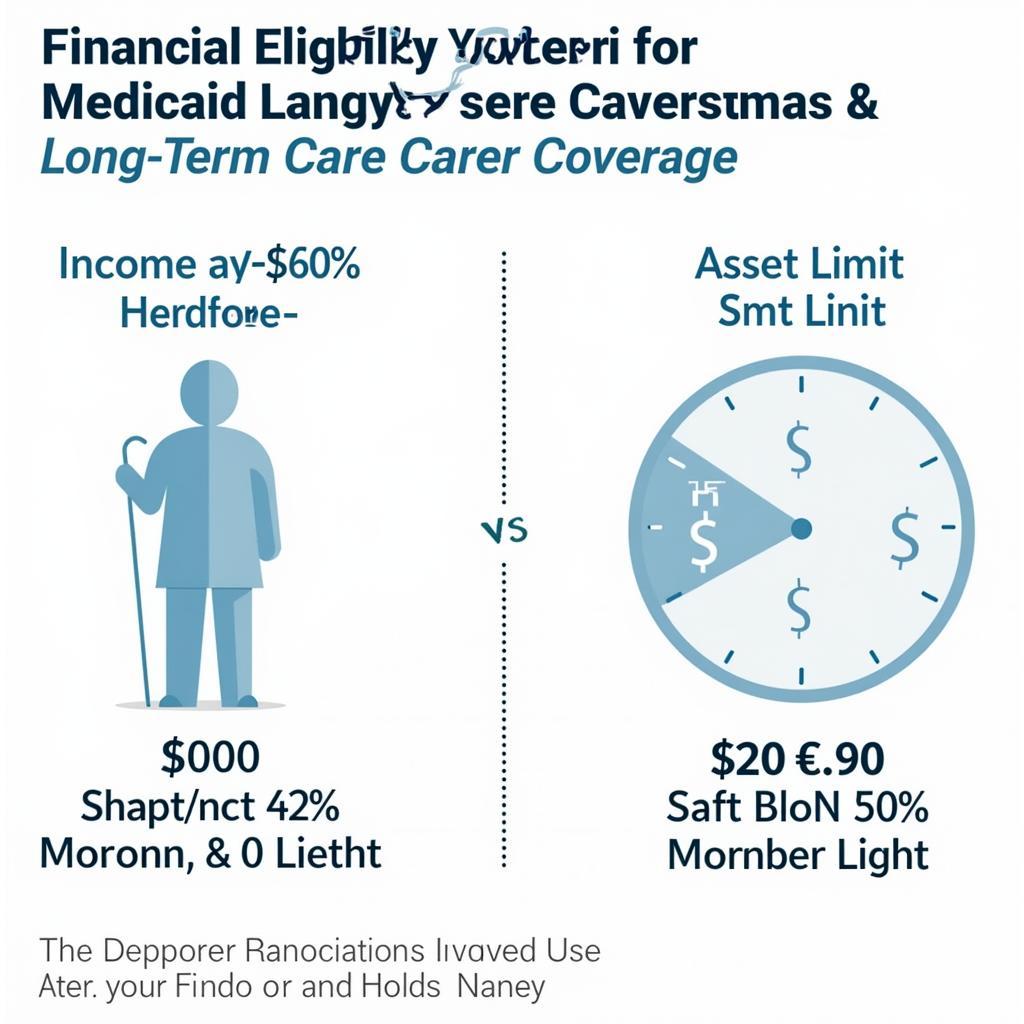Navigating the complex world of long-term care services and their associated costs can be daunting. If you’re wondering, “How are long-term care services paid for in the US?”, you’re not alone. This comprehensive guide breaks down the various payment options available to help you make informed decisions about your future care or that of a loved one.
Understanding Long-Term Care Services
Before delving into payment options, it’s crucial to understand what constitutes long-term care. These services cater to individuals needing assistance with daily living activities due to chronic illnesses, disabilities, or cognitive impairments. This might include help with:
- Bathing and dressing
- Eating
- Mobility
- Medication management
- Toileting
Long-term care services can be provided in various settings:
- Nursing Homes: Offer 24/7 skilled nursing care and supervision for individuals with complex medical needs.
- Assisted Living Facilities: Provide housing, support services, and personal care for those needing help with daily tasks but not intensive medical care.
- Home Health Care: Allows individuals to receive care in the comfort of their own homes. Services range from skilled nursing to personal care and companionship.
- Adult Day Care Centers: Offer structured programs and support for seniors and adults with disabilities during daytime hours.
Paying for Long-Term Care: A Multifaceted Approach
The cost of long-term care can be significant, and unfortunately, there’s no one-size-fits-all answer to the question of payment. However, several avenues can help cover the expenses:
1. Medicare: Covering Short-Term Skilled Care
Many people mistakenly believe that Medicare covers long-term care; however, this isn’t entirely accurate. While Medicare doesn’t cover long-term custodial care, it does provide limited coverage for short-term skilled nursing care or rehabilitation services, typically following a hospital stay.
Eligibility for Medicare coverage is contingent upon:
- A qualifying hospital stay of at least three days
- Admission to a Medicare-certified skilled nursing facility within 30 days of hospitalization
- Requirement for skilled nursing care or rehabilitation services
Medicare coverage for these services is limited to a maximum of 100 days per benefit period.
2. Medicaid: A Safety Net for Low-Income Individuals
Medicaid, a joint federal and state program, serves as a safety net for low-income individuals, including those needing long-term care. Unlike Medicare, Medicaid does cover long-term custodial care, but eligibility is contingent upon strict financial requirements.
To qualify for Medicaid long-term care coverage:
- Individuals must meet income and asset limits, which vary by state.
- A process known as “Medicaid spend-down” might be necessary, where individuals are required to deplete their assets to meet the eligibility criteria.
Navigating the complexities of Medicaid eligibility can be challenging, and seeking guidance from a qualified elder law attorney is advisable.
3. Private Long-Term Care Insurance: Protecting Your Savings
Private long-term care insurance is designed to cover the costs of long-term care services that Medicare and Medicaid don’t. These policies offer a safety net, protecting your savings from the potentially exorbitant costs of care.
Here’s how long-term care insurance works:
- You pay a monthly or annual premium to the insurance company.
- In exchange, the policy covers a portion of your long-term care costs when you need assistance with daily living activities.
The amount of coverage and cost of premiums vary depending on factors like your age, health status, and the chosen policy benefits.
Benefits of Long-Term Care Insurance:
- Protects your assets from being depleted by long-term care expenses
- Provides more choices and flexibility in care options
- Offers peace of mind knowing you have a plan in place
4. Out-of-Pocket Payments: A Last Resort
Paying for long-term care services out-of-pocket should be considered a last resort due to the potential for rapid depletion of savings. However, for individuals with significant assets, it might be a viable option.
Options for Out-of-Pocket Payments:
- Personal Savings
- Investments
- Reverse Mortgages
- Sale of Assets
Planning for the Future: The Importance of Early Action
The question of how long-term care services are paid for in the US is multifaceted, with no easy answers. The ideal approach involves a combination of strategies tailored to your individual circumstances. Seeking guidance from a financial advisor specializing in elder care can be invaluable in navigating these complexities.
Remember, early planning is crucial. By exploring your options and developing a comprehensive long-term care plan, you can ensure financial security and peace of mind for yourself and your loved ones.
Frequently Asked Questions (FAQs)
1. At what age should I start thinking about long-term care insurance?
The ideal time to consider long-term care insurance is between your late 40s and early 60s when premiums are typically lower.
2. Does long-term care insurance cover Alzheimer’s disease?
Yes, most long-term care insurance policies cover Alzheimer’s disease and other forms of dementia.
3. Can I use a combination of payment options for long-term care?
Absolutely. Many people use a combination of resources, such as Medicare, Medicaid, private insurance, and personal savings, to cover long-term care costs.
4. Are there any government programs that help pay for in-home care?
Yes, some government programs, like Medicaid waivers and the Older Americans Act, can provide financial assistance for in-home care services.
5. What are the tax implications of long-term care expenses?
In some cases, long-term care premiums and expenses might be tax-deductible. Consult with a tax advisor for personalized advice.
Need More Help?
We understand that navigating long-term care options can be overwhelming. If you have further questions or need assistance, our team of experts is here to help. Contact us via WhatsApp: +1(641)206-8880 or Email: [email protected]. We offer 24/7 customer support to ensure all your concerns are addressed promptly and efficiently.



